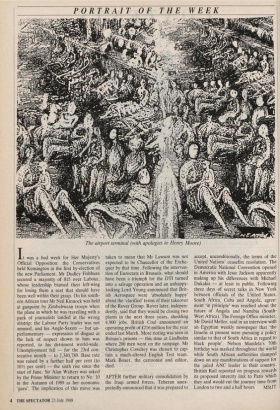PORTRAIT OF THE WEEK
The airport terminal (with apologies to Henry Moore) It was a bad week for Her Majesty's Official Opposition: the Conservatives held Kensington in the first by-election of the new Parliament. Mr Dudley Fishburn secured a majority of 815 over Labour, whose leadership blamed their left-wing for losing them a seat that should have been well within their grasp. On his south- ern African tour Mr Neil Kinnock was held at gunpoint by Zimbabwean troops when the plane in which he was travelling with a pack of journalists landed at the wrong airstrip: the Labour Party leader was not amused, and his Anglo-Saxon — but un- parliamentary — expression of disgust at the lack of respect shown to him was reported, to his detriment world-wide. Unemployment fell — for the 23rd con- secutive month — to 2,340,789. Base rate was raised by a further half per cent (to 101/2 per cent) — the sixth rise since the start of June. Sir Alan Walters was asked by the Prime Minister to return to No. 10 in the Autumn of 1989 as her economic `guru'. The implication of this move was taken to mean that Mr Lawson was not expected to be Chancellor of the Exche- quer by that time. Following the interven- tion of Eurocrats in Brussels, what should have been a triumph for the DTI turned into a salvage operation and an unhappy- looking Lord Young announced that Brit- ish Aerospace were 'absolutely happy' about the 'clarified' terms of their takeover of the Rover Group. Rover later, indepen- dently, said that they would be closing two plants in the next three years, shedding 4,900 jobs. British Coal announced an operating profit of £216 million for the year ended last March. More rioting was seen in Britain's prisons — this time at Lindholm where 200 men went on the rampage. Mr Christopher Cowdrey was chosen to cap- tain a much-altered English Test team. Mark Boxer, the cartoonist and editor, died.
AFTER further military consolidation by the Iraqi armed forces, Teheran unex- pectedly announced that it was prepared to accept, unconditionally, the terms of the United Nations' ceasefire resolution. The Democratic National Convention opened in America with Jesse Jackson apparently making up his differences with Michael Dukakis — at least in public. Following three days of secret talks in New York between officials of the United States, South Africa, Cuba and Angola, agree- ment 'in principle' was reached about the future of Angola and Namibia (South- West Africa). The Foreign Office minister, Mr David Mellor, said in an interview with an Egyptian weekly newspaper that 'the Israelis at present were pursuing a policy similar to that of South Africa in regard to black people'. Nelson Mandela's 70th birthday was marked throughout the world while South African authorities clamped down on any manifestations of support for the jailed ANC leader in their country. British Rail reported on progress towards its proposed intercity link to Paris which they said would cut the journey time from London to two and a half hours. MStJT














































 Previous page
Previous page